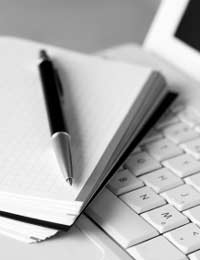Revision Methods: Flash Cards

If you are seeking a revision tool that fits snugly into your pocket, look no further than the humble flash card. They may just be a rectangular square of card but they can work wonders for your revision. This revision tool is ideal when you need to remember vocabulary, specific terminology, statistics or short facts. Make your own by cutting up larger pieces of card, pick some up from a newsagent or see if your school or college offer discounted packs.
Keep It Short and Sweet
Before you create a flash card, think carefully about the best way to present the information in question. When learning vocabulary or terminology, you might find it most effective to simply write one word clearly on each card. If you are jotting down more information, be sure to keep things as simple and as clear as possible.When thinking about what to write on your card, you might discover that you are able to use one word to represent a whole sentence. This will save time and space and help to build connections in your brain. Pare all details down to the minimum and you will be left with a card that acts as a visual aid. If you are a visual learner and if you consult your cards frequently enough in the run up to the exam, you might even find that you are able to visualise the card in the exam and recall all the information you need.
Test Yourself
Flash cards can be put to a variety of uses. Being so versatile, you can even transform them into card games or testing aids. If you are learning vocabulary or terminology, why not try writing the word that is to be learnt on one side of a card and a translation or explanation of it on the reverse. In this way you can use the cards to test yourself both ways. You can make certain that you understand the meaning of a word and you can also ensure that you have remembered the word itself.Even if you are using flash cards to remember longer facts, statistics and arguments, you can still put yourself to the test. Look at your card, then hide it away. Try to recall all that was written on it. Afterwards, go back and see how well you have done and what you missed out. You might even consider giving your cards to a friend or family member and asking them to devise test questions relating to what is written on them. This can be nerve-wracking, but being put on the spot before the exam will exercise your mind and prepare you for the big day.
Flash cards are small and simple but prove incredibly useful when it comes to revision. Create a comprehensive collection of well-presented flash cards to carry with you at all times in the run up to the exam. Whilst they are the perfect way to massage your memory, they can also inspire confidence. Flick through a few very simple flash cards in the moments before your exam and you are bound to enter the exam hall feeling positive and prepared.
- Quick Ideas for Revision Games
- Tackling 'Seen' Exam Questions
- Revision Methods: Testing Yourself
- The Night Before Your Exam
- Useful Materials for Revision
- Revision Methods: Working With a Friend
- Revision Methods: Study Guides
- Setting Revision Objectives
- Revision Methods: Using Forums
- Revision Methods: Past Exam Questions
- Revision Methods: Spider Diagrams
- Motivating Yourself to Revise
- How Much Revision Do I Need to Do?
- Reducing Revision Stress
- Revision Methods: Audio Tapes


Re: Tackling 'Seen' Exam Questions
I am due to sit a seen exam in 2 weeks time. We have been given 7 judgements to read, out of the 7 we will be given to choose…
Re: Revision Methods: Using Forums
I've been using forums loads lately to help me study for my GCSEs, I think they're great. When I've asked questions the answers…
Re: Reducing Revision Stress
Thankyou helped me so much with revision
Re: Reducing Revision Stress
I think this is very helpful because it has helped me do well in my maths exam.
Re: Revision Methods: Audio Tapes
I am just moving on to GCSE but I can't find a way to revise then I remember I learn by listening to things. So where can i get…